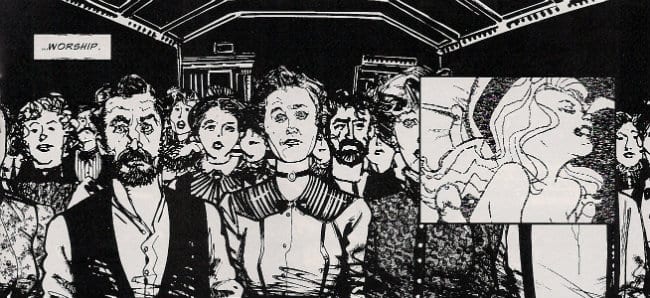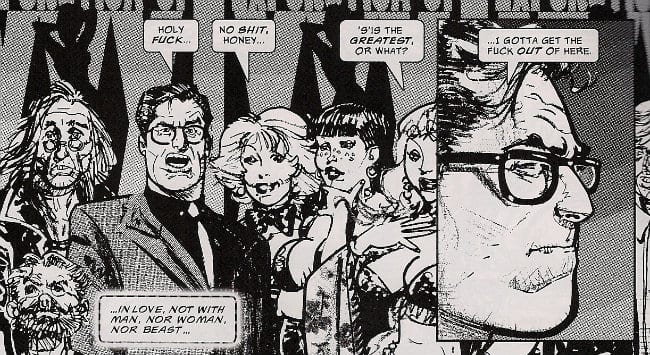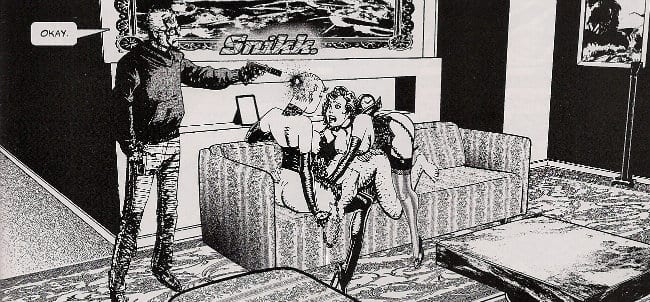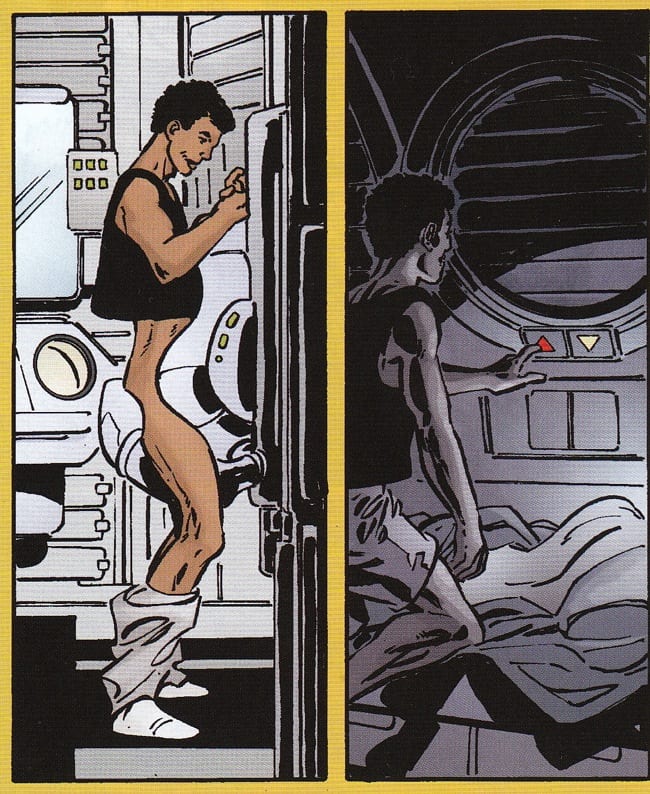Anybody who follows movies on the internet knows there's absolutely no point to watching the damn things other than lording one's moral, aesthetic, and political superiority over people who have watched different movies, or perhaps have watched the same movies in a different way. All is grist for the mill of argument, and heavy is the head that wears the crown of connoisseurship. Always, always you must seek the new thing, so that you are not caught flat-footed praising the Oscar-stained compromises of, say, Benh Zeitlin. Please! I'd tell you Miguel Gomes is the new shit of the moment, but if I've heard of this stuff, I wouldn't trust me to dictate terms, you know?
So it goes, even for 'trash.' Pity poor Django Unchained; every mainstream trumpet that laments its violence sparks a new resentment in those who grind their teeth at the geekiness of Tarantino's references, the broadness of his comedy, and yes - the stagecraft artifice of his squibs. It's soft serve, kids, and so the dedicated shitbug digs deeper into the landfill in search of hard, rich disrepute. William Friedkin's Killer Joe is the movie of the hour in this regard, "[t]he best Russ Meyer film of the year," per John Waters, always an authority. No dorky crap there, I'm assured - just lean, nasty exploitation, from a longstanding workman recently ascended to something of a living saint's status, a patron of mean, gritty mayhem.
I'm not sure you could quite say the same about Howard Chaykin - when I look back to American Flagg!, I always get a sense of buoyancy, of booming satire and dashing cynicism. Its visual style may have been dense and jagged from purposeful noise, but it kept a skip to its step, a joy of execution that later filled the whole of Time2, which remains the artist's best work and his most loosely-plotted, affording the reader instead a tour of its world, which is anyway like a codex to the interests of Howard Chaykin.
Fast-forward to 2012, and Black Kiss 2, the prequel/sequel to Chaykin's 1988-89 LA adult noir, and the bleakest comic he has ever made. This whole post is inspired by Tom Spurgeon, who, after expressing disturbance at the lack of online conversation about the series, declared it "almost ruthlessly unpleasant" and, ultimately, "the anti-life" - he's not wrong, this is a sordid comic almost beyond compare, but what fascinates me is Chaykin's misanthropy not so much directed at his fellow human beings, but against art. Specifically, the cinema.
If the original Black Kiss was, in the words of critic Matt Fraction, "a portrait of the artist as an Angry Young Man with an airtight Hollywood escape plan," Black Kiss 2 sees a Much Older Man, burnt on the fickle favors of screenwriting, surveying the history of cinematographic art and declaring it Dirty. Do you hear me? Dirty. There is absolutely no purpose to the cinema's existence in the world Chaykin creates, other than to rouse sexual desire, and to accumulate the tools that will best facilitate the satisfaction of sexual desire.
This incontrovertible truth is given a mystic imprint at the very top of the work, as a shape-shifting demon explodes into reality during a mass orgy hallucination at an NYC theater in 1906 -- incarnated, one might presume, by the lusts of the crowd -- and thereafter driven to adopt the form of the quintessential (now rather Lynchian) Blonde Starlet, and pass on its loathsome seed to a human woman desirous of perfect looks, perfect youth, of an immortality dictated by poise of movie stars.
What ensues is a grievous whirl of sex and violence, approximately 11,000,000% more explicit than that of the original Black Kiss, which seemed reluctant to depict so much as an exposed penis. Call it a transition from the human point of view of the original to the demonic story of its follow-up, which demands XXX-rated fluid-spewing all-naked action in each and every one of its twelve mini-chapters, matching the setup of the original (albeit with two now included per issue). There is bestiality, dismemberment via fellatio, and a lot of rape, male and female. It's like the series' sense of excess has substituted itself for the clean sort of clutter Chaykin used to build his pages around; stripped of their latter-day garish colors, the artist's digitally augmented pages occasionally strain for clarity, his teeming crowds a motley grouping of smooth and doodled faces, pasted down, at times, in seemingly varied resolutions, with clashy background textures threatening to devour barely-distinctive women, although that last bit is intentional, given the story.
Eunice/Ilona/Blanche/Beverly/Kitty -- the immortal woman -- you see, is both the human host for the cinema demon, and desirous for an ultimate narcissistic lover that can satisfy her every need. Biologically limited by sex, she seeks a partner who will look exactly like her, but with a penis. This launches the most curious thematic concern of Black Kiss 2: all of the most dreadful violence is visited upon transsexuals, yet they also occupy an idealized place, where not a single man who encounters a person in the form of the Blonde Starlet Ideal but With a Penis can resist the experience of knowing a cock's attentions, as if the grace of pop iconography has excused their transgression against the norm. The notion of the transsexual here is intertwined here with that of acting, of fantasy, and finally that of disposability, all of them hapless dirty angels that the Immortal Starlet, the Ideal, somehow gets killed, and eventually comes to try and kill.
This is not an orderly series. Issues #1-4 are the prequel, a series of vignettes, almost like an old-school adventure comic turned entirely towards fucking and murders, its 'heroine' navigating history while her thralls die horribly - beheaded in a guillotine while being sodomized by burly SS thugs, say. Real men's novel stuff. Issues #5-6 comprise the sequel, reuniting us with ruined jazz man Cass Pollack, aging practitioner of a dying art form, his skills appealing only to an aging set of fans, and an also-aging group of ironists who bask in the *naughtiness* of liking him. The kids couldn't possibly give less of a shit. It is very, very difficult to resist an autobiographical reading of this material, particularly given that Pollack is drawn as the typical 'idealized Chaykin' man-of-action, and then made to age, on-page, with his artist.
It is here that Black Kiss 2 reveals itself. Eunice/Ilona/Blanche/Beverly/Kitty is all-consuming, but she's also literally the only character in the story not entirely consumed by racism, misogyny, homophobia, or some other prejudice. She only wants to eat, and Pollack/Chaykin finally comes to embrace his role as her slave, deriving no particular joy or purpose from his muse's direction, but occasionally enduring flights of ecstasy indistinguishable from mortal terror. Entertainment is a low, rotten, destructive force, but at least its illusions are reliable, and preferable to the never-ending atrocity that is the human condition. Hail, farewell, and fuck you indeed.
Perhaps it is prophetic too, in its diminution of Cass Pollack jazz/Howard Chaykin comics. Black Kiss 2 is not available through Diamond in the UK, owing to fears of customs trouble, but even this controversy has prompted little discussion of the series' content. Yet I still think the story's despair is misplaced, or maybe a little canny in restricting itself to American concerns. Chaykin no longer reminds me of an American comics author so much as a seinen mangaka, with recent works like Dominic Fortune, Avengers 1959 and Marked Man adopting a lurid-yet-easygoing tone, liberally dropping historical or educational or satiric material in the name of straightforward escapist adventure. They feel like older comics, for older readers, unconcerned with much in the way of cosmetic flash. They all come from an imaginary North American Big Comic, which makes this new project Chaykin's inevitable foray into Manga Erotics F, the place where artists go to make weird, hugely explicit personal experiments, where they can do anything, so long as there's sex.
In shifting the paradigm, Howard Chaykin continues to belong. And we can imagine this black and dirty theme, this acrid melancholy, as likewise belonging to a very specific place, and not, in the alternate, standing unopposed as a statement of being for all the present.
***
PLEASE NOTE: What follows is not a series of capsule reviews but an annotated selection of items listed by Diamond Comic Distributors for release to comic book retailers in North America on the particular Wednesday, or, in the event of a holiday or occurrence necessitating the close of UPS in a manner that would impact deliveries, Thursday, identified in the column title above. Not every listed item will necessarily arrive at every comic book retailer, in that some items may be delayed and ordered quantities will vary. I have in all likelihood not read any of the comics listed below, in that they are not yet released as of the writing of this column, nor will I necessarily read or purchase every item identified; THIS WEEK IN COMICS! reflects only what I find to be potentially interesting.
***
SPOTLIGHT PICKS!
MAD Artist's Edition: Aah, I do believe this is the first multi-penciller installment for IDW's line of print-the-b&w-original-art-in-color deluxe showcases, as well as the first release organized around a specific anthology comic, rather than a specific artist's output. You'll hardly find a better choice for that than vintage MAD, and this 192-page, 15" x 22" hardcover promises work from Harvey Kurtzman, Will Elder, Wally Wood, Jack Davis, Basil Wolverton and others, totaling 20 stories and 15 covers. I'm not going to do a (cheap!) joke, because let's face it, it's not; $150.00.
Horror Comics in Black and White: A History and Catalog, 1964-2004: No, it's not often we see a book-on-comics up here in the spotlight, but I have a special motive today. Years ago, when I was just preparing to educate myself on the forgotten history of the b&w horror magazines -- a counter-mainstream of comics in the '60s, '70s, and early '80s, one that both lost the battle for continued prominence and lacked any critical support necessary to maintain a retrospective conversation -- I came across the online postings of one Richard J. Arndt, an old-school dedicated fan-addict who'd maintained a master list of every issue, story, and writer or artist to ever see action in most of the main forums on the scene, and not a few minor ones too. These resources were invaluable to me in navigating the putrid, cavernous corpus of Creepy and Eerie and the Skywald horror-mood and fucking Gasm and all the rest, and now they're available in lovely book form from McFarland, 300 pages of HARD DATA, hopefully retaining some of Arndt's editorial comments on the listed funnies. Never visit a hotel con without it! Foreword by Stephen R. Bissette. Contents; $55.00.
--
PLUS!
Calling Dr. Laura: A Graphic Memoir: Damn, nothing quite stokes the embers of '00s nostalgia like seeing "A Graphic Memoir" under the big-ass book publisher listings. I don't know anything about artist Nicole Georges, save that she's an illustrator and minicomic/zine creator of some experience, but I'd totally flip through this 288-page Mariner Books account of family secrets and radio call-in wisdom; $16.95.
The Flowers of Evil Vol. 4: AS SEEN IN THIS COLUMN, your manga pick of the week is definitely the latest, 192-page, Vertical-published installment of Shuzo Oshimi's shonen saga of pretentious youths opposing the romantic and sexual norms of society, motherfuckers. The artist appears to be organizing this series into three-volume arcs, so -- while I'd recommend starting at volume 1 -- this should be an easier jumping-on point than vols. 2 or 3; $10.95.
Deva Zan: Meanwhile, your not-really-manga pick of the week could only be the Dark Horse-published English translation of a 300-page prose novel by Yoshitaka Amano, one of the most popular Japanese illustrators in North America, as in even if you don't recognize the name you'll know his style immediately. Of course, 200 painted illustrations will be included to augment Amano's "personal expression of the legends of Asia for his Western readership," which involves a time-traveling samurai and his interdimensional companions. In hardcover, at 9" x 12"; $49.99.
Young Avengers #1: Back in the day, when the Earth was young -- April, 2005 -- being a writer on The O.C. and other popular programs was more than enough for you to write your own big-time superhero ticket, and so Mr. Allan Heinberg launched Young Avengers at Marvel, and it became a pretty big success. Enough of a success, in fact, that the brand has popped up in some other places, and is now enjoying a full-scale Marvel NOW relaunch fronted by Kieron Gillen & Jamie McKelvie, creators of the well-regarded Image series Phonogram. Pretty colors; big letters - superhero pick of the week, True Believer. Preview; $2.99.
Prophet #33: A continuing comic book series I'm buying! This issue sees Brandon Graham return to scripting, with what appears to be Giannis Milonogiannis as artist, despite the solicitation copy naming Simon Roy. Preview; $3.99.
Garth Ennis' Battlefields: The Green Fields Beyond #3 (of 3): And another! Somebody at Dynamite seems to have gotten the idea to just throw up their hands and pitch this in the manner of Battle Picture Weekly ("THE BIG WAR PAPER" "THE TANKIES GO OUT FIGHTING IN...") - hopefully a variant edition will arrive printed on authentic bog roll. Anyway, this is the end of a long-running recurring storyline by Ennis and authentic '70s combat comix veteran Carlos Ezquerra. Preview; $3.99.
Eerie Archives Vol. 12: Relive the excitement of reading that Richard Arndt book I spotlit above by diving into this latest 272-page Dark Horse hardcover stuffed with Warren stuff. Issues #56-60 are included, featuring Wally Wood, Richard Corben, Paul Neary (albeit in content already compiled in the Eerie Presents: Hunter book from last year), Bernie Wrightson, Tom Sutton, Esteban Maroto, José Ortiz (drawing part one of Bruce Bezaire's siege horror opus Night of the Jackass, which Arndt insists is the all-time best Warren serial), and more. At this point (1974) Eerie had become almost a proto-2000 AD type of violent sci-fi/fantasy magazine, with lots of continuing features and serials, making it a good period to revisit; $49.99.
The Golden Age of DC Comics, 1935-1956: And finally, the art book experts at Taschen bring 400 pages of history by DC's own former president, Paul Levitz, with an original interview with the late Joe Kubert promised. I think there's gonna be five of these, tracking the development of the publisher across the ages; $59.95.














